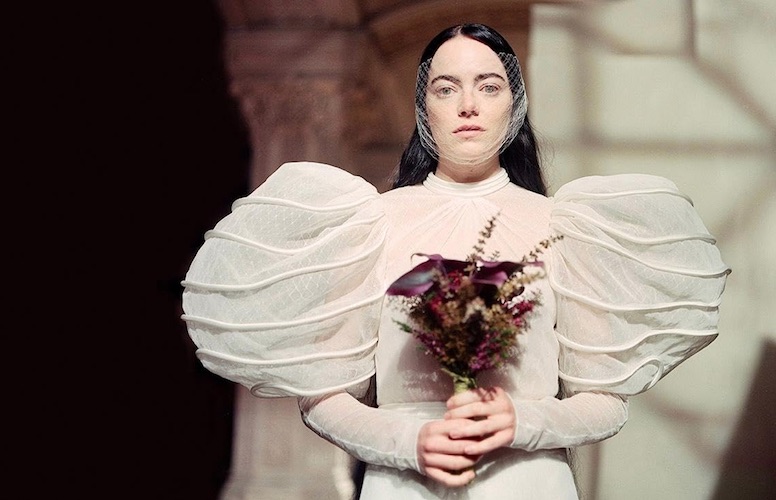
Poor Things, the second collaboration between Greek filmmaker Yorgos Lanthimos and Oscar-winner Emma Stone, is an ecstatically subversive fantasy that imagines how an adult woman might relate to the world if she had somehow sidestepped years of social indoctrination. Beginning in a Gilliamesque version of Victorian era London dappled with whimsy and wonder, Poor Things features Emma Stone as Bella, a wispy young woman with the language and motor skills of a toddler. Bella is the creation of Dr. Godwin Baxter, played by Willem Dafoe, who is fittingly referred to in shorthand as “God.” It’s soon revealed that Godwin has given Bella the brain of a rescued late-term fetus, and even though he treats Bella as a daughter, he also sees her as a scientific experiment that needs to be protected. This means keeping Bella secretly confined inside his expansive mansion.
While delivering a university lecture, Godwin notices he’s piqued the respect of an attentive student named Max, portrayed by Rami Youssef. Godwin approaches Max, reveals to him the existence of Bella, and hires the sensitive young man to document her rapidly evolving maturity. As Bella’s cognitive and sexual development approaches that of a young adult, Godwin observes a growing bond between the two and suggests Max propose marriage, but only on the condition that Bella remains confined to Godwin’s estate. Max agrees to the terms, Bella accepts Max’s proposal, and Godwin hires a lawyer named Duncan, played with sleazy flamboyance by Mark Ruffalo, to draw up a marriage contract. As Godwin dictates the restrictive terms, Duncan becomes overwhelmed with desire to meet the mysterious woman who inspired such possessiveness. When Duncan privately encounters Bella, he quickly seduces her with his misbehaving fingers and an offer to introduce her to the larger world. Poor Things kicks into high gear when Bella, craving independence, agrees to run off to Lisbon with the libidinous Duncan.
Working off a script based on a novel by Alasdair Gray, Lanthimos underscores Bella’s discovery of the wonders and vicissitudes of the world with wry commentary. Throughout Bella’s uproarious fish out of water journey, social conventions and gender expectations are shown to be little more than the agreed upon constructs that they are. Bella is a blank slate, so her instinctual responses to whatever she finds enjoyable, or unenjoyable, make her the perfect foil to so-called polite society. It’s probably not coincidental then that Bella is usually outfitted in dresses with outrageously bulbous shoulders, essentially turning her into a giant phallic symbol – a walking-talking middle finger to the Establishment. But looking through Bella’s childlike eyes, we’re also reminded of the simple pleasures we take for granted, as well as the suffering we’ve become inured to.
Impressively, nearly every secondary character is given a satisfying arc. Standouts include Mark Ruffalo’s silver-tongued womanizer, who in Bella finally meets his match; Willem Dafoe’s Godwin, replete with Frankenstein-like facial scars and nonchalant comments about his father that conjure up images of a torturous childhood; and a surprise third act appearance by Christopher Abbott as the personification of misogynistic oppression. Ultimately, though, it’s Emma Stone’s film all the way. Stone fearlessly embodies the living question mark that is Bella, making Poor Things the most original and entertaining feminist coming-of-age story this side of Barbie.
For KSQD’s Film Gang, this is Paul Kanieski
Would you like to join The Film Gang and write & record movie reviews to air on KSQD? If so, please contact the Program Director, Howard Feldstein: programs@ksqd.org












